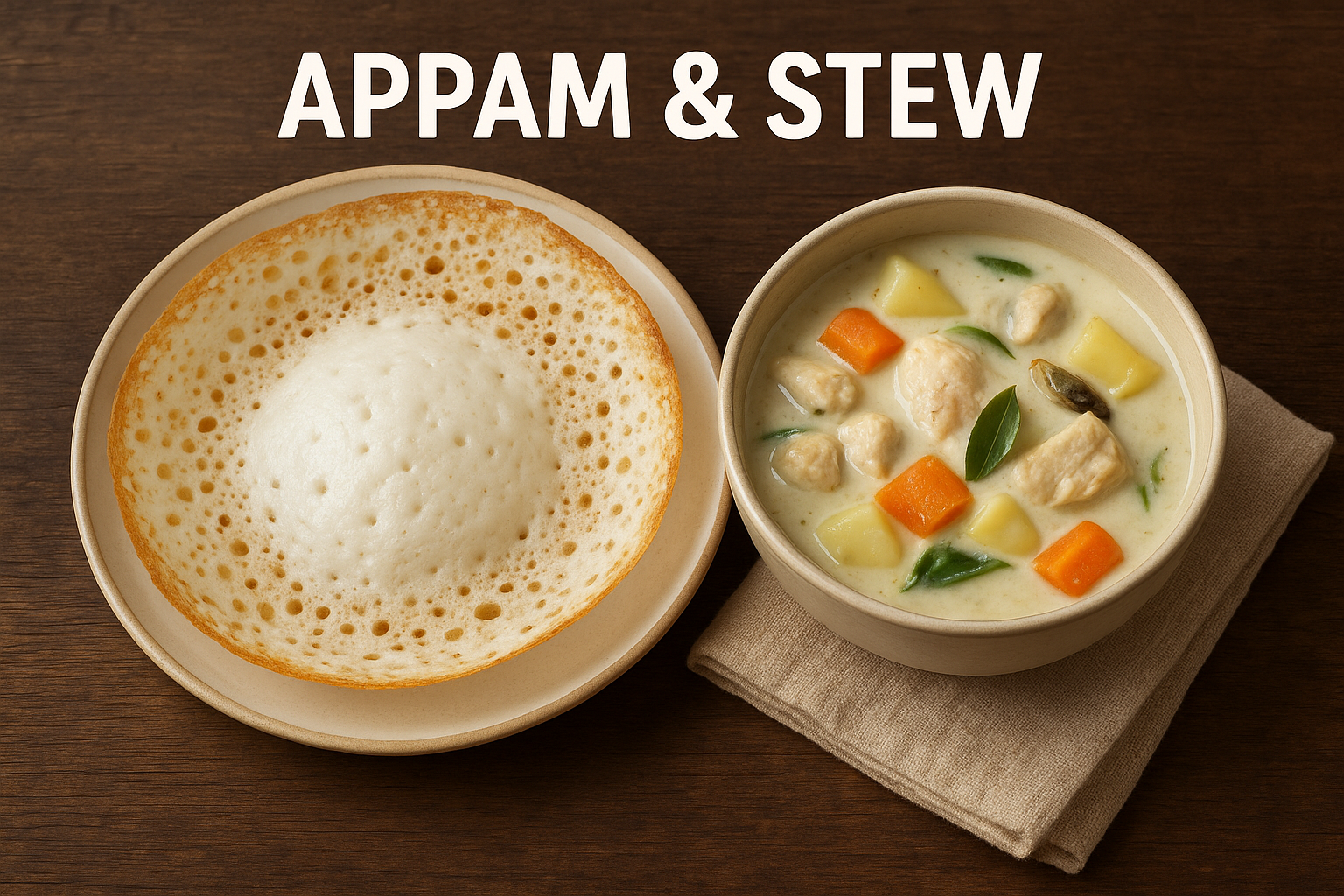Are you looking for a light and comfortable breakfast or dinner that’s also a perfect flavour bomb? When I travelled to Kerala, I discovered a dish, appam with stew, which is a healthy South Indian food. You can indulge guilt-free as the stew consists of mild coconut milk curry, served with a lacy rice pancake. Thanks to its vibrant flavours and comforting plate of food, this traditional healthy South Indian combination has managed to gain popularity far beyond the backwaters of Kerala. Appam with Vegetable Stew is one of the few dishes that best captures the essence of Kerala cuisine. This dish is a celebration of health, simplicity, and deeply ingrained tradition, featuring lacy-edged fermented rice pancakes soaked in a subtle spiced coconut milk gravy. This recipe invites you to experience Kerala on your plate, regardless of your familiarity with South Indian flavours or your love for coconut-rich treats.
Traditionally, the appam batter was fermented using a local alcoholic beverage called kallu, which is made from palm flowers. However, nowadays yeast is used to ferment the batter.
A Journey Through Kerala’s Breakfast Legacy
Appam and stew (Ishtu) trace their origins to the verdant landscapes of Kerala, where coconut palms sway over paddy fields. Appam, also known as paalappam or vellayappam, is a bowl-shaped pancake made from fermented rice and coconut milk batter. Crisp at the edges, soft in the centre, and subtly tangy, it finds mention as early as the 4th–5th century in Tamil Sangam literature.
Stew, or ishtu, is a gentle, aromatic coconut milk-based curry that features vegetables such as potatoes, carrots, and peas. Inspired by coastal and colonial influences, it uses minimal spices—relying on the creamy coconut milk and natural sweetness of vegetables to shine.
This dish became a breakfast favourite for its soul-satisfying flavours, ease of digestion, and adaptability—from festive meals to comforting everyday plates. In today’s plant-forward culinary world, appam with veg stew is recognised globally as a wholesome, gluten-free option packed with fibre, good fats, and vitamins.
Check out our other Kerala Recipes:
Now, Let’s dive into the recipe:
🍽 Ingredients
For the Appam:
- 1 cup raw rice (soaked for 4–5 hours)
- 2 tablespoons cooked rice
- ½ cup grated coconut or thick coconut milk
- ½ teaspoon dry active yeast
- 1 tablespoon sugar
- Salt to taste
- Water as needed for grinding and fermenting
For the Vegetable Stew:
- 1 large potato, peeled and diced
- 1 medium carrot, sliced
- ¼ cup green peas (fresh or frozen)
- 1 small onion, sliced thin
- 2–3 green chillies, slit
- 1-inch piece of ginger, julienned
- 1-inch piece of cinnamon
- 2–3 cloves
- 3–4 whole black peppercorns
- 1 bay leaf
- 2 cups thin coconut milk (first extract)
- ¾ cup thick coconut milk (second extract)
- 1 tablespoon coconut oil
- Fresh curry leaves
- Salt to taste
Step-by-Step Method
Making the Appam Batter:
- Drain soaked raw rice and grind it with cooked rice, coconut, and just enough water to make a smooth batter.
- Dissolve yeast in a little lukewarm water with sugar. Let it sit for 10 minutes until frothy.
- Mix the yeast mixture into the batter, add salt, and ferment overnight (or for at least 8–10 hours) in a warm place.
🍳 Cooking the Appam:
- Heat a non-stick or appam pan. Pour a ladleful of batter in the centre.
- Swirl the pan in a circular motion to spread the batter. The centre will remain thick and fluffy.
- Cover with a lid and cook on medium heat for 2–3 minutes until the edges are golden and lacy.
- No flipping needed. Remove and serve hot.
🥥 Preparing the Veg Stew:
- Heat coconut oil in a heavy-bottomed pan. Add cinnamon, cloves, peppercorns, and bay leaf. Sauté for a few seconds.
- Add onions, ginger, green chillies, and curry leaves. Cook until onions turn translucent.
- Stir in chopped vegetables. Sauté for 2–3 minutes.
- Add thin coconut milk and salt. Cover and simmer until vegetables are tender.
- Pour in thick coconut milk. Gently heat without boiling, then turn off the flame.
🧑🍳 Chef’s Tips
- Use freshly extracted coconut milk for best flavour and creaminess.
- Do not boil the stew after adding thick coconut milk—it may curdle.
- You can use coconut oil generously for an authentic taste.
- To ferment appam batter without yeast, add a handful of cooked rice and ferment slightly longer.
- Leftover stew tastes even better the next day!
🥗 Nutritional Value (per serving)
- Calories: ~320 kcal
- Carbohydrates: 42g
- Protein: 5g
- Fat: 15g
- Fibre: 5g
- Gluten-free: Yes
- Vegan-friendly: Yes
This combo is rich in complex carbs, fibre, and plant-based fats. The coconut milk provides lauric acid—a heart-healthy fat—while the vegetables offer essential vitamins like A and C.
Final Thoughts
Whether you’re preparing a Sunday brunch or looking for a wholesome and simple weekday meal, Kerala-style Appam with Veg Stew is a feast for the body and soul. Lacy, soft appams cradling creamy, coconut-kissed vegetables make for a balanced, delicious plate. It’s a perfect blend of tradition and wellness, and now, your kitchen can echo the calm rhythm of Kerala mornings.
Give this recipe a try and bring a piece of Kerala to your table—one warm, comforting bite at a time.


